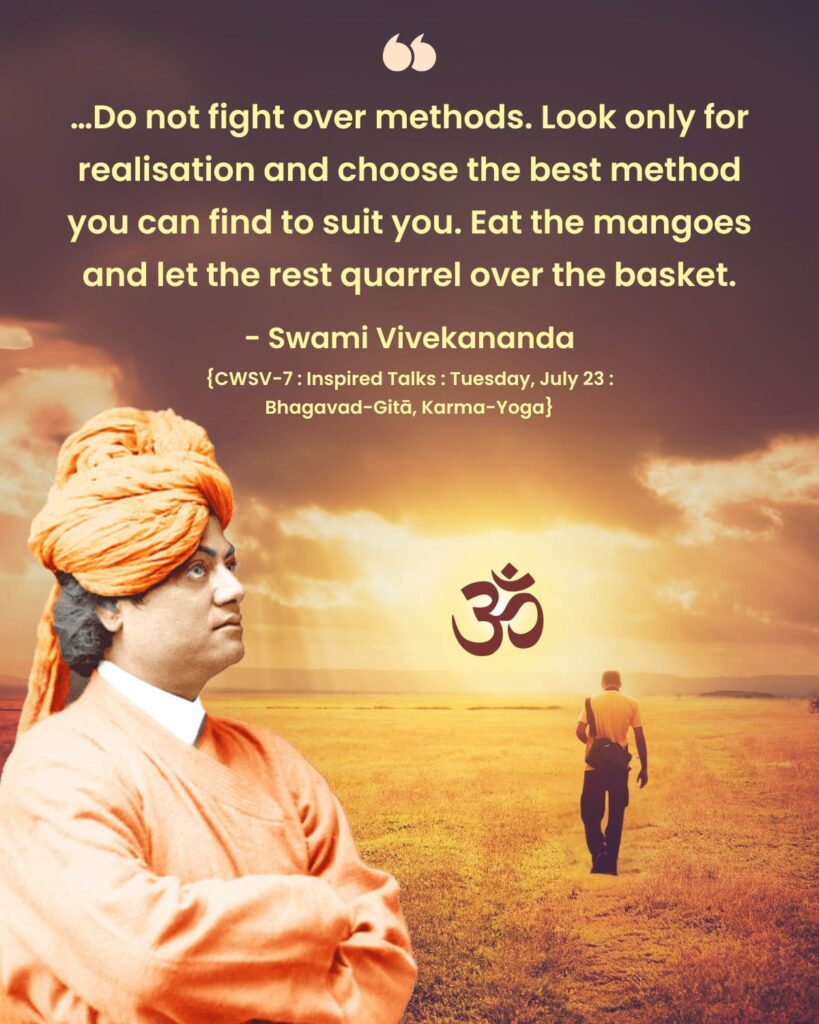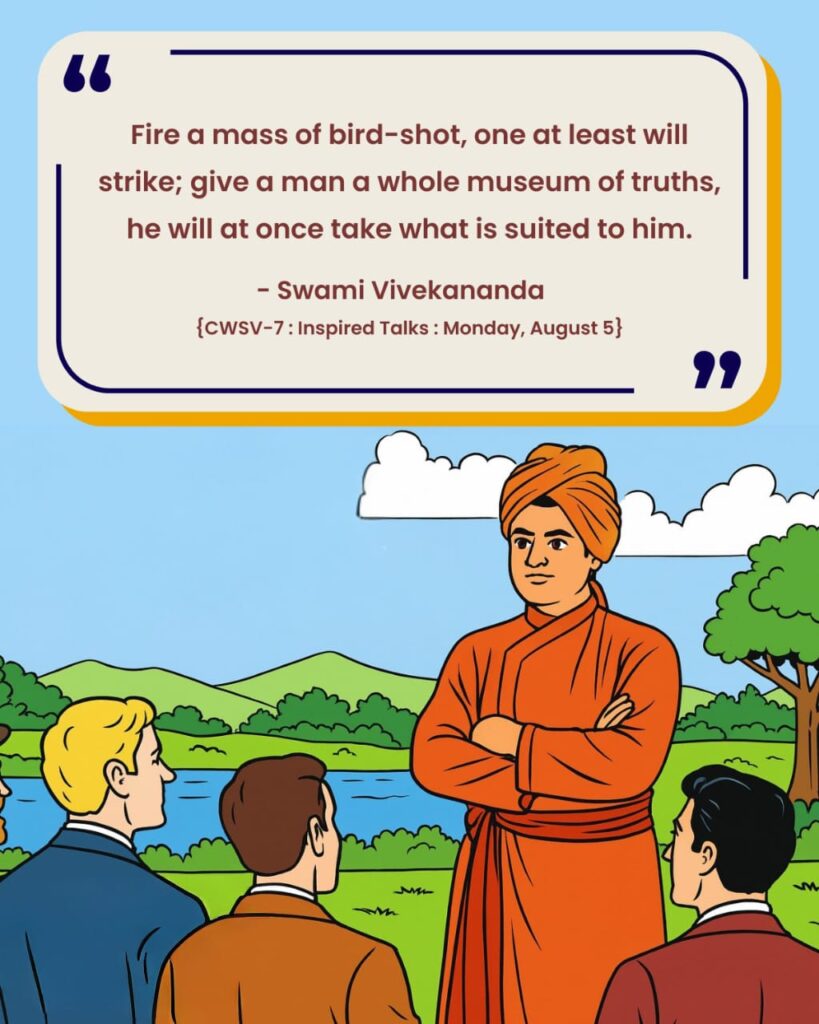इति ते ज्ञानमाख्यातं गुह्याद्गुह्यतरं मया |
विमृश्यैतदशेषेण यथेच्छसि तथा कुरु || 63||
iti te jñānam ākhyātaṁ guhyād guhyataraṁ mayā
vimṛiśhyaitad aśheṣheṇa yathechchhasi tathā kuru
iti—thus; te—to you; jñānam—knowledge; ākhyātam—explained; guhyāt—than secret knowledge; guhya-taram—still more secret knowledge; mayā—by me; vimṛiśhya—pondering; etat—on this; aśheṣheṇa—completely; yathā—as; ichchhasi—you wish; tathā—so; kuru—do
Translation:
Thus, I have explained to you this knowledge that is more secret than all secrets. Ponder over it deeply, and then do as you wish.
Commentary:
The Lord describes the Gita-Sastra as the most secret of all knowledge. The teachings of this wisdom should be communicated only to such disciples who are qualified to receive it. Arjuna was qualified to receive it by virtue of his great devotion to Krishna, and the virtuous qualities (Daivisampat) that he possessed. Lord Krishna has thereby done a great service to mankind. Even for learning any worldly skill or art, a great deal of preparation is necessary for the student. When that is so, what amount of internal and external preparation is necessary for receiving this highest wisdom, one can easily understand. So the Lord declares that he has taught the most secret wisdom to Arjuna, just because he is fit to receive it, and finds it most necessary in the circumstances in which he is placed.
Vimrisyaita daseshena: Fully reflecting over it. It is the practice of all great teachers to give all that the disciple wants by way of teaching and instruction, and finally leave it to the disciple to decide what he should do, and how he should act. Only the narrow-minded teacher insists on the disciple to accept what he says without doubt or question. On the other hand, the great teachers give complete freedom of thought and reflection to the disciples. Man has to make a free choice of his course of action according to his own nature. The disciple should Know and feel the truth of what was taught to him. Then only he derives the full benefit of the master’s teaching. We see in this context how broad-minded the Lord was when he left the freedom of choice to Arjuna himself. Arjuna was one of the greatest devotees of Krishna. Krishna’s word was law unto him. If Lord Krishna wanted Arjuna to fight in the form of a command, Arjuna would have immediately acted up without any hesitation. But the Lord takes a different view. After giving the full message of wisdom, the Lord asks Arjuna to reflect over it, think well and deeply, and come to a voluntary decision. Such a decision would ultimately benefit him much more than a mere verbal command from the teacher. The final decision is left entirely to the individual.
Yadhecchasi tadha Kuru: Act as you wish. The Lord simply explained the position to Arjuna. That is all. He has nothing more to say. The disciple is free to take it or leave it. Here is a great example of Nishkama-karma. Having taught the Gita Sastra, the Lord leaves it without a thought of the fruit of his action. Although the main objective of the Lord is to make Arjuna fight the battle, He remains unconcerned about the result of his message. The Lord seems to say “you may fight or you may not. That is your decision, not mine. I have taught you the essence of all the Vedas, and it is your duty in the present situation, to take it or leave it. I am unconcerned”. Such is the way how great teachers act in respect of their disciples. Their message is delivered in a simple and powerful way. They pass on, leaving it to the people to think about it, draw their own conclusions and come to their own decision. This is an example of Nishkama-karma with which the scripture comes to a close.
Jnanam akhyyatam: Although in the Gita Sastra, the Lord has dealt with Karma, Bhakti, Dhyana, etc., they are all implied in the simple word wisdom (Jnana). The various paths culminate in Jnana. They are all intended to purify the mind gradually, and the mind so purified by the practice of Karma and Bhakti etc., acquires Jnana by which man attains the highest goal of Moksha. Karma and Bhakti are stepping stones to Jnana. Jnana is the peak point of realisation.
Swami Vivekananda Says —
My idea is to bring to the door of the meanest, the poorest, the noble ideas that the human race has developed both in and out of India, and let them think for themselves.[Source]
Liberty is the first condition of growth. It is wrong, a thousand times wrong, if any of you dares to say, “I will work out the salvation of this woman or child.” I am asked again and again, what I think of the widow problem and what I think of the woman question. Let me answer once for all — am I a widow that you ask me that nonsense? Am I a woman that you ask me that question again and again? Who are you to solve women’s problems? Are you the Lord God that you should rule over every widow and every woman? Hands off! They will solve their own problems.[Source]


Disciple: “- instructs his disciples not to practise Japa without taking bath etc. Are such observances compulsory ?”
Swami Saradananda: “The Master came to make religion easy. People were being crushed under the weight of rules and regulations. To repeat the Lord’s name and to worship Him no special time and place are necessary. In whatever condition one may be, one can take His name. The Master never used to give too much importance to these external observances. As to means, adopt whichever suits you best. If you like God with form, that will also lead you to the goal. If you like God without form, well and good; stick to it and you will progress. If you doubt His very existence, then better put the question to Him thus: I do not know whether Thou existeth or not, whether Thou art formless or with form. Do Thou make known to me Thy real nature. As to changing of clothes, taking bath, and other external observances, if you can observe them, well and good; if not, go on calling on Him without paying much attention to all these. The Master once sang a song to me and told me, ‘Assimilate any one of these ideas and you will reach the goal.’ The song runs as follows :
‘O Lord, Thou art my everything, the sole support of my life, the quintessence of reality. There is none else besides Thee in this world whom I can call as my own.
“Thou art happiness, peace, help, wealth, knowledge, intellect, and strength; Thou art the dwelling house and the pleasure garden; Thou art the friend and relative.
“Thou art this present life, the sole refuge; Thou art the life hereafter and the heaven; Thou art the injunction of the scriptures, the Guru full of blessings, and the store of infinite bliss.
‘Thou art the way and the goal; Thou art the creator and preserver and the worshipped; Thou art the father that punishest Thy child, the loving mother and the storehouse of infinite bliss art Thou.” (Source: Spiritual Talks by the First Disciples of Sri Ramakrishna)
Swami Turiyananda: “(To the Sannyasins present) That you people did not enter the world was due to the good impressions of past lives. You have finished all that already, so where was the need for you to enter the world again? It is because you understood everything that you gave up. You have forsooth been born with this privilege. Don’t you see that the world is mad after sense-enjoyment? People run into debt to get married. And before the debt is cleared, perhaps, they die! Whenever anybody spoke to Shri Ramakrishna about giving up the world, he would say, ‘If you are sincere you will find the circumstances gradually becoming favourable.’ He never said, ‘Leave everything and come away.’ ‘If you are sincere that is what he used to say, because he knew the contents of everyone’s mind. (Source: Spiritual Talks by the First Disciples of Sri Ramakrishna)
Swami Turiyananda: “How wonderfully Shri Ramakrishna taught each man so as to remove his particular wants! He used to illustrate it saying, ‘A mother has made various curries out of a fish. She doesn’t give all her boys the same thing. She gives to each what would exactly suit his stomach.’ The Master followed this in practice also.
“Swami Yogananda once heard reproaches against Shri Ramakrishna. He pocketed the affront and reported the matter to the Master. Hearing this Master said, “They abused me and you kept quiet!’ And he rebuked the Swami.
“Again, some time after this event, one day Swami Niranjanananda was coming to Dakshineswar by boat. A number of people in it were criticizing Shri Ramakrishna. The Swami was exceptionally strong. He at once came out of the cabin and placing his legs across began to roll the boat saying, ‘You are abusing Shri Ramakrishna. I shall now sink this boat. I would like to see who dares to oppose me.’ They were all frightened, and besought him to stop. When Shri Ramakrishna heard this he said, ‘You fool, if they abused me, what was that to you? Let everybody say what he likes, what matters it to you?’
“You see the fun! The teaching was different, according to the recipient’s need. Where can you find a teacher like him?” (Source: Spiritual Talks by the First Disciples of Sri Ramakrishna)
Related Articles:
Question: How is the Gita Sastra described?
Answer: As the most secret of all secrets.
Question: Having delivered the message of wisdom, what should be the attitude of the teacher?
Answer: He should leave it to the disciple to reflect over it deeply, and act according to his own wish.
Bhagavad Gita: Chapter 18 🔻 (78 Verses)
| 01 | 02 | 03 | 04 | 05 | 06 | 07 | 08 | 09 | 10 |
| 11 | 12 | 13 | 14 | 15 | 16 | 17 | 18 | 19 | 20 |
| 21 | 22 | 23 | 24 | 25 | 26 | 27 | 28 | 29 | 30 |
| 31 | 32 | 33 | 34 | 35 | 36 | 37 | 38 | 39 | 40 |
| 41 | 42 | 43 | 44 | 45 | 46 | 47 | 48 | 49 | 50 |
| 51 | 52 | 53 | 54 | 55 | 56 | 57 | 58 | 59 | 60 |
| 61 | 62 | 63 | 64 | 65 | 66 | 67 | 68 | 69 | 70 |
| 71 | 72 | 73 | 74 | 75 | 76 | 77 | 78 |
